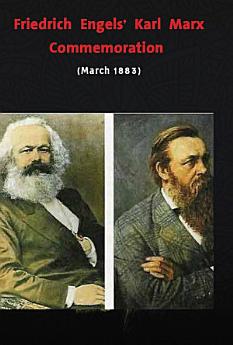Friedrich Engels’ Karl Marx Commemoration
About this ebook
On March 14th, at a quarter to three in the afternoon, the greatest of living thinkers ceased to think. He had been left alone for. barely two minutes; but when we entered his room we found that, seated in his chair, he had quietly gone to sleep – forever.
The loss which his death has inflicted upon the fighting proletariat in Europe and America, and upon the science of history, is immeasurable. The gaps that will be made by the death of this titan will soon be felt.
What Marx Contributed
Just as Darwin discovered the law of evolution in organic nature, so Marx discovered the law of evolution in human history. He discovered the simple fact (heretofore hidden beneath ideological excrescences) that human beings must have food and drink, clothing and shelter, first of all, before they can interest themselves in politics, science, art, religion, and the like.
This implies that the production of the immediately requisite material means of subsistence, and therewith the extant economic developmental phase of a nation or an epoch, constitute the foundation upon;which the state institutions, the legal outlooks, the artistic and even the religious ideas of those concerned have been built up. It implies that these latter must be explained out of the former, whereas usually the former have been explained as issuing from the latter.
Nor was this all. Marx likewise discovered the special law of motion proper to the contemporary capitalist method of production and to the bourgeois society which that method of production has brought into being. The discovery of the surplus value suddenly threw light here, whereas all previous investigators (socialist critics no less than bourgeois economists) had been groping in the dark.
Two such discoveries might suffice for one man’s lifetime. Fortunate is he who is privileged, to make even one discovery so outstanding. But in every field he studied (the fields were many and the studies were exhaustive), Marx made independent discoveries – even in mathematics.
I have pictured the man of science. But the man of science was still only half the man. For Marx, science was a motive force of history, was a revolutionary force. Whilst he took a pure delight in a purely theoretical discovery, in one which had not and perhaps never would have a practical application, he experienced a joy of a very different kind when he was concerned with a discovery which would forthwith exert a revolutionary influence on industry, on historical evolution in general. For instance, he paid close attention to the advances of electrical science and, in late years, to the discoveries of Marcel Deprez.
But, above all else, Marx was a revolutionist. To collaborate in one way or another in the overthrow of capitalist society and of the state institutions created by that society; to collaborate in the freeing of the modern proletariat, which he was the first to inspire with a consciousness of its needs, with a knowledge of the conditions requisite for its emancipation – this was his true mission in life. Fighting was his natural element. Few men ever fought with so much passion, tenacity and success. His work on the Rheinische Zeitung in 1843, on the Parisian Vorwaerts in 1844, on the Deutsche Brüssler Zeitung in 1847, on the Neue Rheinische Zeitung in 1848 and 1849, on the New York Tribune from 1852 to 1861; a great number of pamphlets; multifarious activities in Paris, Brussels and London; finally, as crown of his labours, the foundation of the International Workingmen’s Association: there you have his record. Had Marx done nothing but found the International, that was an achievement of which he might well have been proud.
Because he was an active revolutionist, Marx was the best hated and most calumniated man of his time. He was shown the door by various governments, republican as well as absolute. Bourgeois, ultra-democrat as well as conservative, vied with one another in spreading libels about him. He brushed these aside like cobwebs, ignored them, only troubled to answer them when he positively had to.
Yet he has gone down to his death honoured, loved and mourned by millions of revolutionary workers all over the world, in Europe and Asia as far eastward as the Siberian mines, and in America as far westward as California. I can boldly assert that, while he may still have many adversaries, he has now hardly one personal enemy.
His name and work will live on through the centuries.
About the author
Friedrich Engels (/ˈɛŋɡəlz/ ENG-gəlz;[2]







